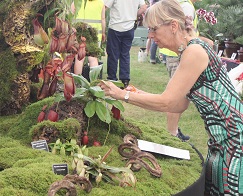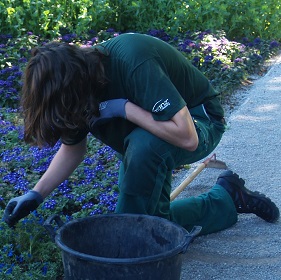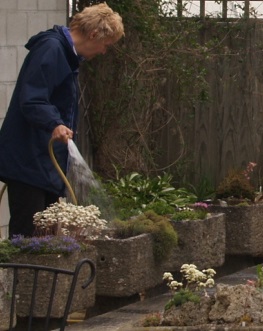COURSE CONTENTS
There are ten lessons in this course:
1. The Plant Kingdom (part a)
- The classification and taxonomic hierarchy of seed-bearing plants
- The use of botanical keys to identify plants
- Stages of plant growth and life cycles
- The structure and function of plant cells and tissues
- The processes of meiosis and mitosis
- The differences in the external and internal structure of monocotyledons and dicotyledons.
2. The Plant Kingdom (part b)
- The identification and function of the external vegetative parts of higher plants: roots, leaves, stems and buds
- The identification and function of flowers
- The identification and function of fruits and seed.
3. The Plant Kingdom (part c)
- The importance of photosynthesis and respiration
- Transpiration and translocation of water throughout the plant
- Pollination and fertilisation

- Seed formation and germination
- Growth regulation including phototropism and photoperiodism.
4. Plant Propagation
- How to differentiate between plants produced by seed (sexual) and plants produced by vegetative propagation methods (asexual)
- Seed propagation
- Cutting propagation
- Propagation aftercare
- Layering
- Propagation tools
- Grafting
- Propagating plants in a greenhouse
5. Outdoor Food Production
- Growing outdoor food crops
- Timing crops
- Making gardens more productive
- Sustainable land management
- Composting
- Companion planting
- Vegetable crowing
- Fruit crops
- Pests and diseases of crops
- Windbreaks
- Crop harvesting
6. Garden Planning
- Collecting pre-planning information
- Preparing landscape plans
- The principles, elements and procedures of landscape design
- Creating landscape effects
- Using hard and soft landscaping materials.
7. The Root Environment and Plant Nutrition
- The physical properties of soil
- Techniques for improving soil
- The importance of organic matter in the soil

- Soil water
- Watering systems
- Drainage systems
- Soil pH
- Carbon and nitrogen cycles
- Soil nutrients and their effect on plant growth
- Fertilisers
- Properties of growing media
8. Protected Cultivation
- Greenhouse types and shade houses
- Environmental controls in protected environments
- Irrigation and nutrition control
- Containers and growing media in protected environments
- Care and display of indoor plants
- Production of selected crops in protected cultivation (tomato, lettuce, begonia, rose).
9. Horticultural Plant Selection, Establishment and Maintenance
- The selection of plants for different purposes
- Guidelines for selecting plants
- Environmental factors affecting plant selection
- Selecting particular plants (which ones to buy)
- Planting techniques
- Selection, establishment and maintenance of turf, annuals, herbaceous plants, shrubs, trees, hedging plants and climbing plants
- Pruning in the home garden
- Mulching
10. Horticultural Plant Health Problems
- Plant problems and their identification
- Pests

- Diseases
- Environmental problems
- Chemicals and their use
- Non-chemical controls
- Weed problems and their identification control
DURATION
Most students should budget on spending 150 hours or more doing this course if they hope to be successful.
AIMS
- Demonstrate a broad range of horticultural knowledge; communicate clearly and coherently in writing on horticultural matters; and relate horticultural science to its practical application.
- Understand the classification of higher plants and appreciate the internal structure of higher plants.
- Understand the external structure of higher plants.
- Develop an understanding of the principles and main practices of plant propagation in horticulture.
- Understand the fundamental physiological processes within the plant including photosynthesis, respiration, water movement, pollination, fertilisation, seed formation and germination.
- Develop an understanding of the principles and main practices of plant propagation in horticulture.
- Understand basic cultural operations and production methods necessary to obtain outdoor food crops.
- Understand basic surveying and design principles and apply them to basic garden design and planning requirements.
- Develop an understanding of the constituents, properties and management of soils and growing media.
- Develop an understanding of environmental control and plant cultivation in greenhouses and other protected environments.
- Develop an understanding of plant selection, establishment and maintenance of a range of ornamental plants.
- Develop an understanding of pest, diseases and weeds that affect horticultural plants, and the cultural, biological, chemical and integrated systems used to control those problems.

Where Can this Course Lead?
This course is deigned as a broad foundation, and can lead you anywhere you want to go, or wherever you find opportunities arise in horticulture:
- In itself, it is sufficient to start a small business or start seeking employment in gardening businesses, plant nurseries, on farms, in parks or anywhere else in the realm of horticulture.
- Some students may use this as a fist step toward higher studies.
- Use this to expand and compliment experience or qualifications you already have e.g. people with qualifications in science or management may already have valuable knowledge for working in horticulture; but without the "pure" horticultural learning that comes from this type of course; you may struggle to relate that knowledge to horticulture -or struggle to convince clients or employers of your usefulness.
Student Comment: "I have found the
course material to be comprehensive and informative and have learnt a
lot and really enjoyed my year of study. The office staff at ACS have
always been helpful and efficient and quick to respond to requests or
queries. My tutor, Adriana, was encouraging and supportive, as well as
being really thorough in the way she marked my assignments. I had not
studied for 20 years before I started my ...Certificate... and the
feedback and reassurance I received from my tutor made all the
difference." Katherine Parry, Australia
Why Study With ACS?
-
Our courses are written and taught by experienced professionals, so you know you can expect a high quality of teaching and support.
-
You can start the course at any time and study at your own pace.
-
Fit your studies around your own busy lifestyle - we provide full tutor support for all the time you are studying.
-
Study where you want to - online or eLearning (USB Memory Stick) options of study offer the flexibility for you to determine where and when you study.
QUESTIONS?
If you have any questions, our horticulture tutors are here to help you - please get in touch with them by using our FREE COURSE COUNSELLING SERVICE.
Stay in Touch. Follow ACS on
Twitter
Facebook
Google